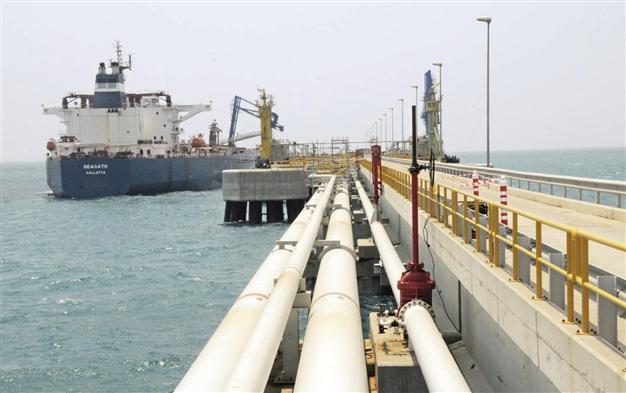
Iraqi Kurdish crude oil flow to the Turkish port of Ceyhan has started again after completion of works to increase the pipeline’s capacity. AA Photo
Crude oil flow on Iraqi Kurdistan’s pipeline to Turkey has resumed after upgrade work was completed and is now running at an increased rate of 200,000 barrels per day (bpd), industry sources and Turkish officials told Reuters Aug. 21.LONDON - Reuters
A tanker carrying crude oil from Iraqi Kurdistan reappeared unladen
on Aug. 19 about 30 kilometers off the coast of Israel, ship tracking
data on Reuters showed.
This is the second time the Kamari has appeared in the area in the last two weeks carrying Kurdish oil.
The
tanker Kamari was partly laden north of Egypt’s Sinai on Aug. 17,
tracking showed, before it turned off its satellite transponder until
early on Aug. 19. It was not possible to determine where the oil had
been delivered to or who the buyer was.
A spokesman for the
Kurdistan Regional Government (KRG) Ministry of Natural Resources did
not immediately respond to phone calls and emails seeking comment on
Aug. 20. The KRG has previously denied selling oil to Israel “directly
or indirectly.”
The tanker loaded the Kurdish crude at the
Turkish port of Ceyhan around Aug. 8, and made a partial delivery to
Croatia via a ship-to-ship transfer last week.
Hungary’s MOL
Group said on Aug. 18 that it had purchased 80,000 tonnes, just under
600,000 barrels, of Kurdish crude, which discharged at Croatia’s Omisalj
port at the weekend. The company has exploration and production assets
in Kurdistan.
Iraq’s central government in Baghdad has repeatedly
called independent Kurdish exports “smuggling”, saying only state
marketer SOMO has the right to sell Iraqi oil. The KRG says the Iraqi
constitution allows it to sell oil independently of Baghdad.
Since
the KRG began exporting major volumes via its pipeline, Baghdad has
actively tried to block sales and has so far been successful in stopping
one to Morocco and another to the United States. Baghdad has also cut
the Kurds out of the country’s budget since January. Despite the setbacks, an increasing number of cargoes are now finding buyers.
Two
weeks ago, the same 1 million barrel tanker loaded Kurdish oil at
Ceyhan before sailing to a point just under 200 km (125 miles) off the
Israeli and Egyptian coasts.
Reuters AIS Live ship tracking
showed the ship was fully loaded, based on its draft in the water. After
turning its satellite tracking off on Aug. 1, the ship reappeared four
days later sitting far higher in the water - indicating it had unloaded
its cargo of disputed oil.
It was not possible to determine which
port the oil aboard the Kamari had been delivered to or who the buyer
was. In June a cargo of Kurdish oil that sailed from Ceyhan aboard the
United Emblem Suezmax tanker was delivered into Israel after being
transferred at sea to another ship.
In June, the SCF Altai
tanker delivered 1 million barrels of Kurdish crude to Israel’s Ashkelon
port for an unknown buyer. It was the first successful delivery of
Kurdish oil from the region’s new pipeline to Turkey, though the KRG
denied selling oil to Israel directly or indirectly.